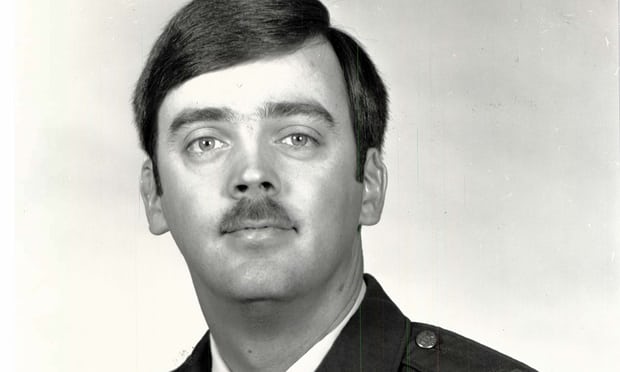That ended last week when agents from the US air force office of special investigations apprehended Hughes in California, where he had been living since he disappeared.
Hughes enlisted in the air force in 1973, worked in Alabama and studied for a master’s degree through the Air Force Institute of Technology in Ohio. He was assigned to Kirtland air force base in Albuquerque, New Mexico, in 1981, working with weapons systems and with access to top-secret Nato information.
On his apprehension, he told investigators that in the summer of 1983 he became depressed about being in the air force. So he decided to leave.
On 1 August that year, Hughes failed to show up to work at Kirtland as scheduled. He never showed up there again. Ten days later, he was declared missing. In December, he was declared a deserter.
Investigators shared an image of the blue-eyed, brown-haired male with police departments across the US and Europe. But his name and face soon vanished from newspaper headlines.
“Interviews of friends, associates and co-workers failed to disclose information regarding Hughes’ whereabouts,” the US air force said in a statement. “Checks with law enforcement agencies both in the United States and overseas also failed to locate him.”
Until last week, the air force said, Hughes had not been seen by authorities since the day he withdrew $28,500 from 19 branches of his bank in Albuquerque. The Seattle native was single when he disappeared and had three sisters, according to the Albuquerque Journal.
Then, earlier this month, the missing officer’s fate was revealed during an investigation of passport fraud. The US state department was interviewing a man who claimed to be called Barry O’Beirne about inconsistencies in his identity. Hughes admitted his given name.
In his air force days, Hughes’ duties included classified planning and analysis of Nato command, control and communications surveillance systems. He went missing shortly after completing a mission to the Netherlands, to test radar surveillance planes.
According to a 17 January 1984 article by the Associated Press, when Hughes’ disappearance was made public the FBI said there was no indication of espionage. Capt Carol Northrup, then a public affairs officer at Kirtland air force base, told the AP: “When he disappeared, he wasn’t carrying classified information.”
Nonetheless, over the years some have speculated that Hughes defected to the Soviet Union or was taken by a foreign government.
After Hughes’ discovery, a spokeswoman for the office of special investigations, Linda Card, told the Albuquerque Journal that investigators still had many questions to answer. But she also said no classified information leaks were suspected and said there was no indication Hughes was involved with the Soviet Union.
“Until we have the whole story, we don’t have the story,” Card said, adding that Hughes’ family had been notified about his apprehension. The air force did not know, Card said, if the family had known Hughes’ whereabouts for the past 35 years or if they had been in contact with him.
Arrested without incident, Hughes is now being held at Travis air force base in California. If found guilty of desertion he faces a maximum penalty of dishonorable discharge, forfeiture of all pay and confinement of five years.
More about: #USAir-Force
















































